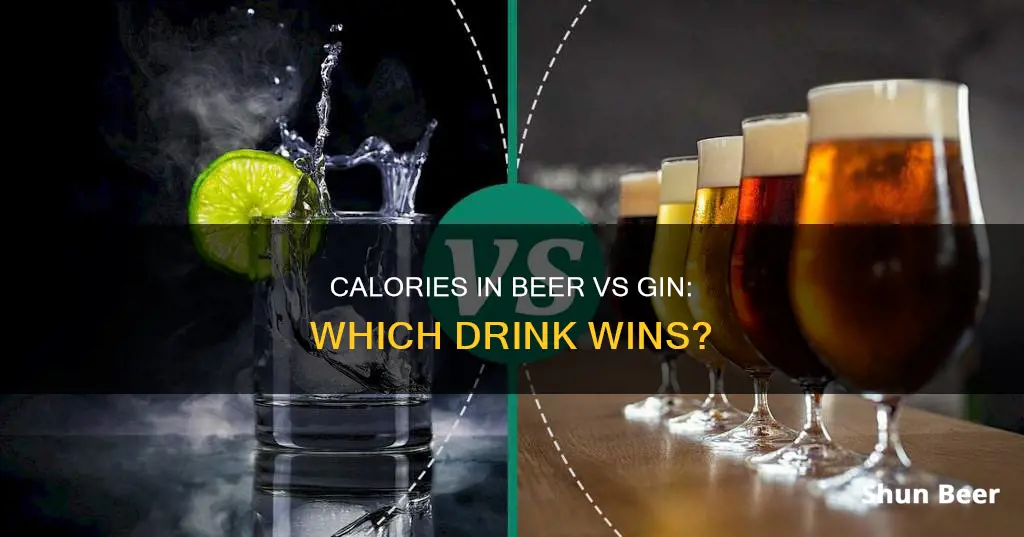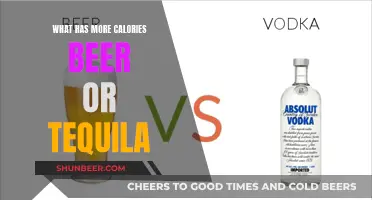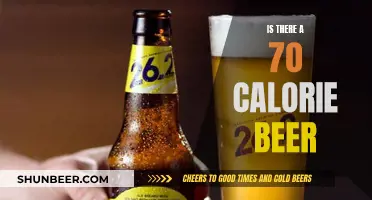
Alcoholic drinks can be calorific, and cocktails mixed with soda, juice, cream, or ice cream can be especially high in calories. Beer and gin are both popular drinks, but which has more calories? A small bottle of beer (330ml) contains 142 calories, whereas a single measure of gin (25ml) with a diet mixer contains only 54 calories. A single measure of gin with a mixer or fruit juice contains 108 calories. Therefore, gin is the lower-calorie option.
| Characteristics | Values |
|---|---|
| Calories in a single measure of gin (25ml) with a diet mixer | 54 |
| Calories in a single measure of gin with a mixer or fruit juice | 108 |
| Calories in a medium glass (175ml) of wine | 159 |
| Calories in a small bottle (330ml) of beer | 142 |
| Calories in a pint of cider | 216 |
| Calories in a single glass (125ml) of champagne | 89 |
| Calories in a pint of lager | 149 |
What You'll Learn
- A small bottle of beer has more calories than a single measure of gin with a diet mixer
- Beer has more congeners than gin, which can make hangovers worse
- Gin is a waistline-friendly option compared to beer
- Beer has more calories than spirits like gin, vodka, and whiskey
- Gin and tonics are lower in calories than beer

A small bottle of beer has more calories than a single measure of gin with a diet mixer
When it comes to alcoholic beverages, it's important to consider not only the number of calories but also the nutritional value they provide. Most alcoholic drinks offer little to no nutritional benefits, and the calories can add up quickly. For example, cocktails mixed with soda, juice, cream, or ice cream can be especially high in calories.
However, gin is a relatively low-calorie option compared to other alcoholic drinks. A single measure of gin with a regular mixer or fruit juice contains 108 calories, which is still lower than a small bottle of beer.
Beer, on the other hand, tends to have a higher calorie count. The average beer has around 149 calories per pint, and craft beers with higher alcohol content can have even more. So, if you're looking to make healthier choices, opting for gin with a diet mixer is a better option than beer.
It's worth noting that the mixer you choose can significantly impact the calorie count of your drink. Sugary mixers, such as Coke, Red Bull, or lemonade, can add hundreds of extra calories to your drink. Therefore, opting for low-calorie mixers like soda water or diet tonic can help reduce your overall calorie intake.
Beer vs Soda: Which Drink Packs More Calories?
You may want to see also

Beer has more congeners than gin, which can make hangovers worse
A standard small bottle of beer (330ml) contains 142 calories, whereas a single measure of gin (25ml) with a diet mixer contains only 54 calories. However, when it comes to hangovers, the story is a little more complex.
Beer has more congeners than gin, and congeners are thought to contribute to hangovers. Congeners are biologically active compounds that are formed during the fermentation and aging processes of alcohol production. They are responsible for the taste and aroma of drinks but have been shown to worsen hangover symptoms. The darker the drink, the more congeners it is likely to contain. Beer and bourbon have more congeners than gin, which is a clear spirit.
The British Medical Association has reported that congeners are partly to blame for feelings of nausea and general unwellness after drinking. As a result, clear drinks like gin are less likely to cause a severe hangover. The more distilled a spirit is, the lower the number of congeners it will contain. This is why highly distilled "top-shelf" liquors are less likely to result in a hangover than cheaper alternatives.
There are several theories as to why congeners contribute to hangovers. One theory suggests that the body has to break down congeners, which competes with breaking down ethanol, resulting in alcohol lingering in the body for longer and contributing to hangover symptoms. Another theory is that congeners stimulate the body to release stress hormones, causing inflammatory responses that lead to hangover symptoms such as fatigue.
In summary, while beer may have more calories than gin, gin is more likely to lead to a hangover due to its higher congener content. However, it is important to note that other factors also contribute to hangovers, and drinking any type of alcohol in excess will likely result in a hangover.
Beer Calories: Little Brown Note's Secrets Unveiled
You may want to see also

Gin is a waistline-friendly option compared to beer
If you're watching your weight, it's important to be mindful of the calories in your drinks. A typical small bottle of beer (330ml) contains 142 calories, while a single measure of gin (25ml) with a diet mixer only has 54 calories. That's less than half the calories!
Cocktails often have the highest level of calories because of the sugary goodness that makes them taste so delicious. But gin with a diet mixer is a smart choice if you're looking for a drink that won't derail your diet. It's also a good idea to stick to clear drinks like gin, as they contain fewer congeners, which are partly to blame for that feeling of nausea and grossness after drinking.
If you're looking for a drink that won't pile on the pounds, gin is a great option. It's lower in calories than beer and other alcoholic drinks, and it's less likely to give you a hangover. So, if you're trying to stay trim, a gin and tonic is a waistline-friendly choice.
Not all cocktails are created equal, though. Many are packed with sugars and calories. But there are some low-calorie options, like a mojito without sugar or a vodka, soda, and lemon. You can also try a Martini (gin, vermouth, lemon peel) or a Negroni (gin, vermouth, Campari, orange slice). These drinks have fewer added sugars and can be a better choice if you're watching your weight.
It's worth remembering that alcohol contains calories that can add up quickly. Going out for a couple of drinks can easily add 500 calories or more to your daily intake. So, whether you're choosing gin or beer, it's important to drink in moderation and be mindful of your overall calorie intake.
Calories in Alcohol: Beer, Wine, and Malt Beer Compared
You may want to see also

Beer has more calories than spirits like gin, vodka, and whiskey
Cocktails often have the highest level of calories because of the sugary additives that make them taste so good. A Manhattan, for example, has around 160 calories per drink, and a Cosmopolitan has around 200 calories. Beer is not far behind, with an average of 149 calories per pint.
If you are looking for a drink with fewer calories, spirits with low-sugar mixers are a good option. Straight spirits contain the least amount of calories as they are nearly entirely ethanol without added sugar. Vodka has the lowest calories, at around 100 calories per shot (50ml), followed by whiskey and gin at 110 calories per shot.
You can further reduce the calorie count by choosing a spirit brand with a lower alcohol percentage. For example, an 80-proof vodka (40% alcohol) has 64 calories per ounce, while a 100-proof vodka (50% alcohol) has 82 calories per ounce.
So, if you're watching your calorie intake, opting for a spirit like gin or vodka with a low-calorie mixer is a better choice than beer.
Lite Beer Battle: Fewest Calories Wins
You may want to see also

Gin and tonics are lower in calories than beer
If you're watching your weight, it's important to be mindful of the calories in your drinks. Alcoholic beverages can quickly add hundreds of extra calories to your daily intake, and most alcoholic drinks offer little to no nutritional value. Cocktails are often the worst offenders, as the sugar and mixers used to make them taste delicious can result in very high-calorie counts.
Beer is no exception to this rule. On average, a pint of beer contains around 149 calories—that's about the same as a large slice of pepperoni pizza! If you're looking for a drink that will be kinder to your waistline, gin is a much better choice. As long as you stick to diet mixers or just add a squeeze of lime, a gin and tonic can be a relatively low-calorie way to enjoy a drink.
Of course, it's important to remember that even gin and tonics do contain calories, and those calories can add up if you're not careful. But compared to beer, gin and tonics are definitely the lower-calorie option. So, if you're trying to make healthier choices without giving up alcohol entirely, opting for a gin and tonic instead of a beer is a smart move.
In addition to being lower in calories, gin also has a few other advantages over beer. Clear drinks like gin contain fewer congeners, which are compounds that can contribute to hangover symptoms. So, if you choose a gin and tonic over a beer, you may find that you feel less nauseous and gross the next day.
Space Dust Beer: Calorie Count for Elysium's Brew
You may want to see also
Frequently asked questions
A small bottle of beer (330ml) has 142 calories, whereas a single measure of gin (25ml) with a diet mixer has only 54 calories.
A pint of beer has around 149 calories.
A pint of lager has the same calorie count as a pint of beer, around 149 calories.
A gin and tonic has 108 calories.
A gin and slimline tonic has 54 calories.







